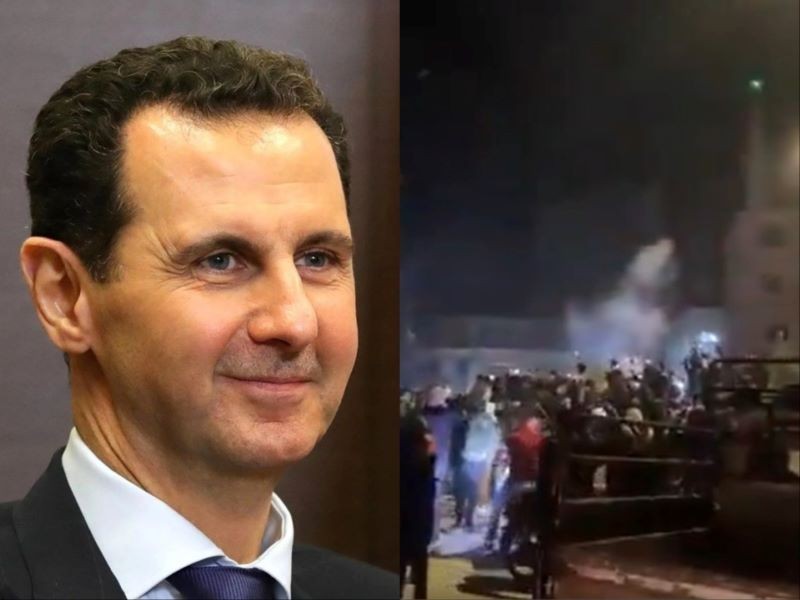
Syria's 'secular dictator' Assad flees as Islamist-led rebels capture Damascus amid looming uncertainty
Damascus: Bashar al-Assad, Syria’s President who is widely seen as a dictator who ruled the country with an iron hand but was also hailed as one of the last secular Arab leaders by many, has fled to an unknown destination as Islamist-led rebel groups advanced at lightning speed, media reports said.
According to a statement on Sunday, rebel forces in Syria declared Damascus “free,” claiming Bashar al-Assad has fled the capital, reported BBC.
“We declare the city of Damascus free from the tyrant Bashar al-Assad,” the Military Operations Command wrote in a post on Telegram, reported CNN. “To the displaced all over the world, a free Syria awaits you,” the statement added.
The rebels claimed to have taken control of the notorious Saydnaya Military Prison north of Damascus before entering the capital.
Once perceived as unassailable, Assad’s regime collapsed like a pack of cards on the face of a swift aggression led by a group called Hayat Tahrir al-Sham (HTS), formerly known as the Al-Nusra Front affiliated with terror group Al-Qaeda, and allied factions.
Bashar al-Assad’s era started in 2000 when he succeeded his father Hafez al-Assad, who governed Syria with an iron fist for nearly three decades. After Assad’s ascension, people hoped that Bashar would bring progressive changes and transparency to Syria.
However, their hopes were soon dashed as he maintained the stranglehold on power, continuing with the repressive structure of his father's rule.
Assad, who was backed by Russia for a long time, will be remembered as the man who crushed peaceful protests against his regime in 2011, triggering a civil war that led to the deaths of over half a million people and forced six million others to become refugees.
 Bashar al-Assad flees Damascus as rebel storm capital. Photo courtesy: Wikimedia Commons & videograb from X
Bashar al-Assad flees Damascus as rebel storm capital. Photo courtesy: Wikimedia Commons & videograb from X
Protector of Syrian minorities
Assad will also be remembered for protecting the religious minorities in Syria.
According to a 2011 article in Al Jazeera, in Syria there exists a diverse set of communities strongly bonded by language, region, religion, and ethnicity.
"The Sykes-Picot Agreement, the secret deal reached between the colonial British and French during World War I, partitioned the Middle East based on British and French interests rather than the interests of those living in Syria.
"The result of the arbitrary divisions made the newly formed Syrian nation a highly ethnically and religiously diverse society – without establishing the governing institutions to harmoniously facilitate such a society. This arrangement led to decades of civil war and coup d’états in Syria until the iron-fisted Assad regime rose to power," the article by Majid Rafizadeh, an Iranian/Syrian Fulbright scholar, explained.
Promise of stability
In a recorded message on Sunday morning, Syrian Prime Minister Mohammad Ghazi al-Jalali expressed the government’s willingness "to cooperate with any leadership the people choose."
“We are ready to cooperate with any leadership the people choose, offering all possible support to ensure a smooth and systematic transition of government functions, preserving state facilities,” he said, according to CNN.
Al-Jalali urged Syrians to safeguard public facilities, emphasizing collective ownership.
“I am here in my home, did not leave and do not intend to leave it except in a peaceful manner to ensure the continuing operation of public institutions, state facilities, and to broadcast safety and security for all citizens,” he stated.
He further added, “We extend our hands to every Syrian citizen who is concerned about safeguarding this nation’s assets… I urge all citizens not to harm any public property because, ultimately, it belongs to them.”
Meanwhile, Ahmed al-Sharaa, the militant leader of Hayat Tahrir al-Sham (HTS), the prominent faction leading Syria’s armed opposition, issued a directive to rebel forces to avoid targeting state institutions.
“To all military forces in the city of Damascus, it is strictly forbidden to approach public institutions, which will remain under the supervision of the former Prime Minister until they are officially handed over, and it is also forbidden to fire bullets into the air,” al-Sharaa, also known as Abu Mohammad al-Jolani, wrote on Telegram.
In an interview with CNN on Thursday, Jolani projected a vision for a transformed Syria, marking a shift in his public persona by using his real name, Ahmed al-Sharaa, for the first time instead of his well-known nom de guerre (assumed name for combat).
Uncertain future looms
In a report, BBC notes that Syria will face a critical crossroads once the celebrations subside. Amid jubilant gunfire, as the triumphant rebels empty Assad’s prisons and torture chambers, Syria risks falling into the grip of another harsh regime. In short, the future of Syria hangs in the balance.
If Abu Mohammed Al-Jawlani, leader of HTS—the dominant rebel group behind the victory—stays true to his promises, there is hope for the country to move towards a more inclusive and democratic future, with support from the UN and other international players, according to the BBC report.
However, HTS and its allies carry a history marred by allegations of violence and human rights violations.
Recognized as a terrorist organization by the UN and several governments, the group’s reputation is a matter of concern.
Meanwhile, al-Qaeda has already called on the rebels to target "Jews and Crusaders," their term for Christians, causing fear among Syria’s many minorities.
This also highlights that non-Sunni Muslims, have a strong reason to worry about what lies ahead.
While some early signs suggest a managed power transition could be possible, there is a looming danger that Syria could spiral into chaos, just as Libya slipped into a prolonged turmoil of warring factions, looting, and instability.
How did Asad fall?
Just a week ago, the downfall of Bashar al-Assad seemed almost unimaginable as rebels launched their extraordinary offensive from Idlib in northwestern Syria.
Assad, who took power in 2000 following the death of his father Hafez—who ruled for 29 years with an iron grip—inherited a tightly controlled and repressive political system. Initially, there was hope that the younger Assad might bring a transparent and less oppressive approach, but those expectations were quickly dashed.
With support from Russia and Iran, Assad managed to crush opposition forces and hold onto power for years.
This time, however, things were different. Preoccupied with their own challenges, Assad’s key allies largely left him to fend for himself. Without their backing, his forces proved unable—and in some cases unwilling—to halt the rebels’ advance.
The rebels first captured Aleppo, Syria’s second-largest city, followed by Hama, and then Homs—a pivotal stronghold. Within hours, they had entered Damascus.
While the collapse of the Assad regime may appear sudden, it stems from years of contributing factors.
“Assad's army has been decimated by years of war,” said Dara Conduit, a political scientist at the University of Melbourne specializing in Syria. She noted that Assad’s allies—Russia, Iran, and Hezbollah—have been distracted by their own conflicts. “Now, Assad is in a particularly weak position,” Conduit told BBC News.
Still, she described the swift turn of events as “nothing short of remarkable.” Following the capture of Homs, Syria’s third-largest city, rebel forces advanced on Damascus, and reports soon emerged that Assad had fled the capital by plane to an undisclosed location.
US President-elect Donald Trump posted on social media: "Assad is gone. He has fled his country. His protector, Russia, Russia, Russia, led by (President) Vladimir Putin, was not interested in protecting him any longer."
Who are Syrian Rebels?
Syria's rebel coalition, comprising Islamist and moderate factions, is united against the Assad regime, ISIS, and Iran-backed militias despite internal differences, according to CNN.
Key Groups:
Hayat Tahrir Al Sham (HTS): Led by Abu Mohammad al-Jolani, HTS evolved from Jabhat al-Nusra after splitting from al Qaeda in 2016. Though distancing itself from ISIS and al Qaeda, it remains designated as a terrorist organization by the US and others, with a $10 million bounty on Jolani.
Syrian National Army (SNA): A Turkish-backed coalition of diverse factions, including the National Liberation Front, which seeks to overthrow Assad and establish Islamic governance. Some members also fight Kurdish forces.
Druze Fighters: Members of Syria's Druze minority are actively involved in the southern city of as-Suwayda and nearby Daraa province, where opposition forces claim territorial gains.
Meanwhile, the multi-front conflict includes battles involving Kurdish-led Syrian Democratic Forces (SDF), viewed by Turkey as affiliated with terrorism, complicating alliances further.
Support Our Journalism
We cannot do without you.. your contribution supports unbiased journalism
IBNS is not driven by any ism- not wokeism, not racism, not skewed secularism, not hyper right-wing or left liberal ideals, nor by any hardline religious beliefs or hyper nationalism. We want to serve you good old objective news, as they are. We do not judge or preach. We let people decide for themselves. We only try to present factual and well-sourced news.







